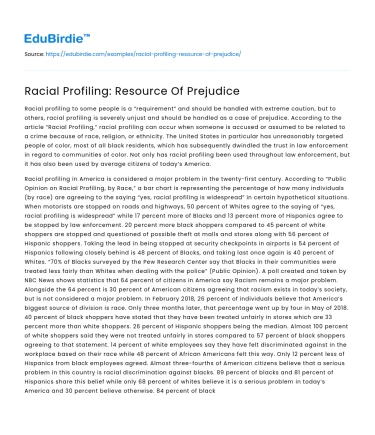Introduction
Racial profiling remains a contentious issue that continues to spark debate and discord in societies worldwide. Defined as the discriminatory practice of targeting individuals for suspicion of crime based on their race, ethnicity, or national origin, racial profiling is often justified by law enforcement agencies as a necessary tool for crime prevention. However, its implications reach far beyond security measures, encroaching on the realms of civil liberties and human rights. According to the American Civil Liberties Union, racial profiling is a "practice that undermines fundamental human rights." This essay will explore the depth of racial profiling as a resource of prejudice, examining its roots, its impact on communities, and the counterarguments that attempt to justify its existence. Through the examination of real-life cases and scholarly perspectives, this essay aims to shed light on the pervasive influence of racial profiling and its role in perpetuating systemic bias.
The Roots of Racial Profiling
Understanding the origins of racial profiling is essential to addressing its persistent presence in modern society. Historically, racial profiling can be traced back to practices such as the "slave patrols" in the United States, which sought to control and monitor Black populations. These early forms of surveillance laid the groundwork for contemporary profiling tactics employed by law enforcement. According to sociologist Joe Feagin, "racial profiling is a direct descendant of the racialized social control mechanisms established during slavery." The practice has evolved, but its underlying motivations remain rooted in a desire to maintain power dynamics through racial categorization.
In recent decades, racial profiling has been further institutionalized by policies such as "stop-and-frisk" in New York City. Data from the New York Civil Liberties Union indicates that over 80% of individuals stopped under this policy were Black or Latino, despite these groups comprising a smaller proportion of the city's population. This disproportionate targeting highlights how racial profiling is not merely a matter of individual bias but a systemic issue embedded within law enforcement practices. The systemic nature of racial profiling is further evidenced by studies suggesting that minorities are more likely to be stopped and searched despite lower rates of contraband possession compared to their white counterparts.
The Impact on Communities
The repercussions of racial profiling extend beyond individual experiences, affecting entire communities and their relationship with law enforcement. Communities of color disproportionately bear the brunt of profiling tactics, leading to a pervasive sense of mistrust and fear. This erosion of trust hinders effective policing by discouraging community cooperation, which is vital for crime prevention and resolution. For instance, a study by the Pew Research Center found that only 33% of Black Americans had confidence in police officers to treat them with fairness, compared to 75% of white Americans.
Moreover, racial profiling fosters an environment where prejudice is normalized, perpetuating stereotypes and reinforcing societal divisions. The psychological impact on individuals who are repeatedly subjected to profiling cannot be understated. Being consistently treated as a suspect based solely on racial characteristics can lead to feelings of alienation, anxiety, and a diminished sense of belonging. These emotional and psychological effects further exacerbate the social inequalities that profiling purportedly aims to address, creating a vicious cycle of discrimination and marginalization.
Counterarguments and Justifications
Proponents of racial profiling often argue that it is a pragmatic approach to crime prevention, suggesting that certain racial groups have higher crime rates and thus warrant increased scrutiny. However, this rationale is flawed as it relies on stereotypes rather than empirical evidence. A study by the Stanford Open Policing Project revealed that racial disparities in traffic stops are not indicative of higher crime rates among minorities but rather reflect biased policing practices. This undermines the argument that racial profiling is an effective tool for maintaining public safety.
Furthermore, the justification that racial profiling aids in counterterrorism efforts is similarly dismantled by data. The FBI's Terrorist Screening Center has reported that the vast majority of individuals on watchlists are not involved in terrorist activities. Racial profiling, therefore, diverts resources from genuine threats, compromising national security instead of enhancing it. The reliance on profiling as a security measure ultimately detracts from developing more effective, evidence-based policing strategies that could better serve diverse communities.
Conclusion
In conclusion, racial profiling is a multifaceted issue with profound implications for the fabric of society. It is a practice deeply entrenched in historical prejudices, perpetuating systemic discrimination and societal division. The negative impact on community relations and individual well-being underscores the urgent need for reform in law enforcement practices. While proponents may argue for its utility in maintaining public safety, the evidence suggests that racial profiling is not only ineffective but counterproductive. As such, addressing racial profiling requires a commitment to dismantling institutional biases and fostering an environment of trust and equality. Through continued advocacy and policy reform, society can move toward a future where justice is truly blind to race, and equity serves as the cornerstone of public safety.






 Stuck on your essay?
Stuck on your essay?

